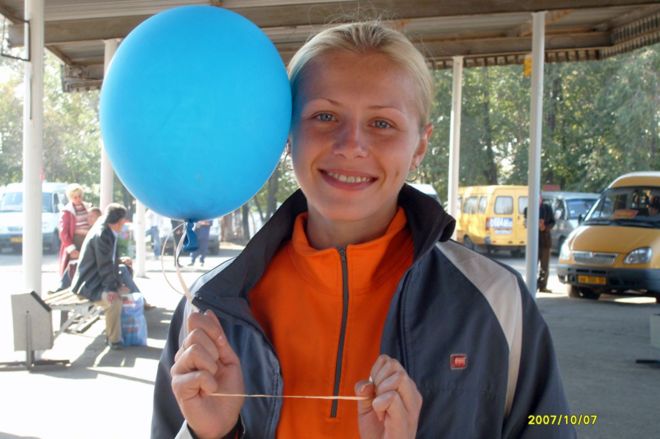Fearing for her safety, Russian 800m runner Yuliya Stepanova fled her country after she revealed the dirty secrets of doping in Russian athletics. She has been called the greatest whistleblower in the history of sport but what do people think of the athlete in her homeland?
An elderly woman has dragged her rug outside for an airing and flings it over a washing line as snowflakes whirl through the air. "That girl is a traitor," she says. "She blackened our government and the whole country." She whacks the carpet hard. "Yuliya was taking those drugs herself and now she tries to look whiter than white!"
We are on the industrial outskirts of Kursk in south-west Russia, among crumbling concrete flats and old houses - many of them wooden and at at wonky angles to the ground. Overhead the red and white striped chimneys of the power plant pump out clouds of steam into the icy air.
The rug thumper tells me she lives in the same staircase as the athlete's family. Stepanova's mother, Lyuba, is out but I meet her stepfather, Sergei, who is about to start a shift at his factory making conveyor belts for coal mines.
He tells me that after his stepdaughter left Russia, his wife was harangued at the hospital where she works for raising "such an unpatriotic daughter". Not surprisingly, Lyuba wants to keep a low profile and isn't keen on an interview.
Mentioning Yuliya Stepanova's name is not always a wise thing to do. At her old school, when we ask if we could meet some of her former teachers, the livid-looking headmistress almost throws us off the premises.
But there is some support for her in Kursk. "Sport must be honest so I think she did the right thing", says a girl out shopping with her mother in the town centre. At a bus stop, an engineering student says, "I can't say I'm proud of her but she did what needed to be done." Even a stern-looking pensioner is unexpectedly supportive. Yuliya acted "according to her conscience", she tells me, and "betrayed nobody".
The official stance towards Stepanova is hostile, though. President Putin's spokesman called her a "Judas". Newspaper headlines and cartoons portray her as a self-publicist or a money -grabber. Online there are even calls for her "liquidation".
Many here blame her revelations about Russia's state-run doping system for the ban on the country's entire track and field team at the 2016 Rio Olympics.
She knew the system well because for six years she was part of it.
Her doping career began in 2007 when her coach in Kursk, Vladimir Mokhnev, gave her testosterone injections. Currently suspended by the International Athletics Federation, Mokhnev denies her accusations but Stepanova kept a careful record of all the drugs she was taking.
Before long she had moved on to anabolic steroids and erythropoietin, the hormone that boosts red-blood-cell production. Her performance quickly improved and she was given a place on the national team.
At this point, a top sports scientist and expert on doping, Dr Sergei Portugalov, assured her that she could "run dirty" in the national championships and that he would ensure any positive test result would be covered up, she says. But in 2013 her blood passport showed abnormalities and she was banned from competition for two years. She became pregnant. Together with her husband, Vitaly Stepanov, a former anti-doping official, she decided to report her coaches to the World Anti-Doping Agency (Wada).
Stepanova wrote a 10-page confession about all the drugs she had taken, who had given them to her and everything she had witnessed. But when nothing happened, she realised she need more proof and began secretly recording meetings on her mobile phone. With the phone discreetly tucked into an outer pocket of her bag, and the video function rolling, she contrived meetings in which the cream of Russian athletics were captured discussing the use of banned performance-enhancing drugs.
Those tapes were broadcast on German television and led to an investigation by Wada in November 2015 in which Stepanova, in her role as a key informant, is named more than 100 times.
There followed two reports commissioned by Wada from an independent investigator, Richard McLaren.
The first, based on the testimony of a former director of Russia's anti-doping lab, described foul-play at the Sochi Olympics - a state security agent disguised as a plumber, steroid-and-whisky cocktails for Russian athletes and doctored urine samples smuggled through secret mouse holes in the wall of a laboratory.
The second, published earlier this month, was even more damning, and concluded Russia had been systematically cheating for four years from 2011, making what amounted to "an unprecedented attack on the integrity of sport".
But despite all the evidence in these reports, backed up by lab tests, forensic reports and testimony from other insiders, the authorities seem to be in denial. Svetlana Zhurova, a former speed skater and now a deputy in the Duma, Russia's parliament, ridicules the idea of state-sponsored doping.
"We do have some athletes who break the law and coaches who supply drugs but what has the government got to do with it?" she asks. "Do you think that Vladimir Vladimirovich Putin controls each sportsperson and says, 'Take these tablets?' That is not happening and will never happen."
Stepanova should have reported doping abuses to the Russian police, she says. When I suggest that the athlete may have been too scared, Zhurova is scornful.
"Why was she scared? Just look how many corruption cases are under investigation at the moment. We live in different times. This isn't the Soviet Union!"
Artyom Patsev, a Moscow lawyer representing several athletes accused of doping tells me his clients reject the evidence and call Stepanova a self-interested hypocrite.
"She is not a hero because there's nothing brave in what she did," he says. "The main motive for her, as for any other athlete who is and who was doping, is a financial motive."
Actually Stepanova received nothing in return for her evidence. She served a full two-year suspension for taking drugs herself. She's been doing her best to pay back the prize money she won by deception. And she's given up a well-paid career in Russian athletics.
Many Russians tell me the country's athletes have been unfairly targeted, thanks to Stepanova's whistleblowing, when doping is a worldwide problem - not just a Russian one.
In response to this accusation, Travis Tygart, head of America's anti-doping agency, Usada, acknowledges that there are cheaters everywhere, but says doping in Russia is on a completely different scale. "When you have a state system that corrupts the laboratory, corrupts the sports systems, corrupts the athletes, the coaches who coach the athletes, the doctors that advise the athletes, that's just not the same at all," he says.
In his State of the Union address earlier this month Vladimir Putin said foreign powers had leant on his country in various ways, from spreading "myths about Russian aggression" to "besmirching our athletes". But despite his spokesman's earlier denunciation of Stepanova as a traitor, he also acknowledged there was a problem. "Every cloud has a silver lining", he said. "This so-called 'doping scandal' will allow us to create the most advanced system to fight this evil."
Anna Antseliovich, the acting general director the Russian anti-doping agency, Rusada, insists her agency is grateful to Yuliya Stepanova and her husband Vitaly, its former employee. But she adds that many Russians were deeply troubled by the way in which Stepanova collected her evidence. "So many were killed or sent to prison because of informants in the Stalin era. So we do not welcome whistleblowers - it is part of our mentality."
When Yuliya Stepanova couldn't finish the 800m race at the European Championships in July because of a foot injury, there was little sympathy for her.
"I didn't expect much - Yuliya is very weak psychologically and she can only run when she has been doping," her former coach Vladimir Kazarin told Sport Express newspaper. He added that if she was really training clean "then she won't achieve anything and won't get to her former levels".
To those who dismiss her so lightly, both in Russia and the wider world, David Walsh, the journalist who brought down the cyclist Lance Armstrong - perhaps the world's most famous drugs cheat - says it's time to think again.
"People have kind of said, 'Oh well she's a doper.' Well those people are showing a huge lack of empathy for where she's come from and what she's done. If they bothered to look closely at her story, they'd have nothing but unqualified admiration for what Yuliya Stepanova has done," he says. "Now to me, you know, there's nobody who has done more for the anti-doping movement. No whistleblower comes within a million miles."
Stepanova is now determined to prove that she can succeed as a clean athlete. She is training hard and hopes to qualify for the 2017 World Championships in London next summer. It is not easy because she has to prepare on her own. When she approached a coach in the American city where she now lives, she replied it was "too dangerous" for her to take her on.
In a country she doesn't know, with a language she is only beginning to learn, her life has been turned upside-down. But she has few regrets about the turbulence she's brought to world athletics.
I ask how she will feel if in the future she finds herself competing alongside Russian athletes who say she betrayed them?
"If they want to hate me that's their problem," she says. "I don't consider that I've done anything wrong, I told the truth, I tried to help, and if they prefer to lie that's their problem and their hatred stays with them."
(BBC)
www.ann.az
Follow us !











